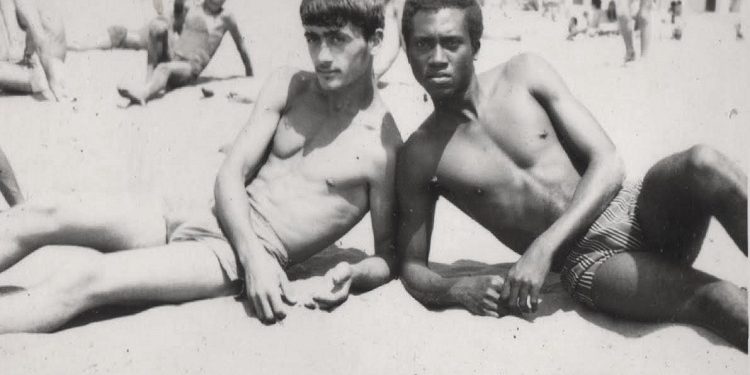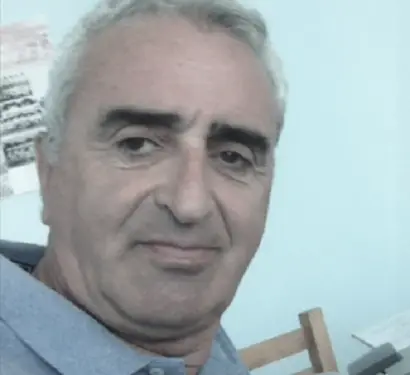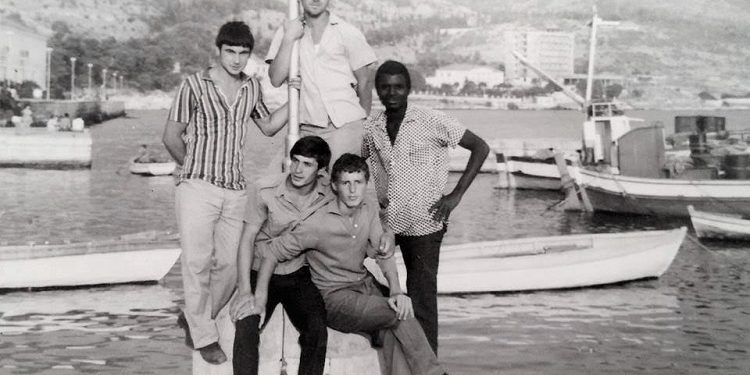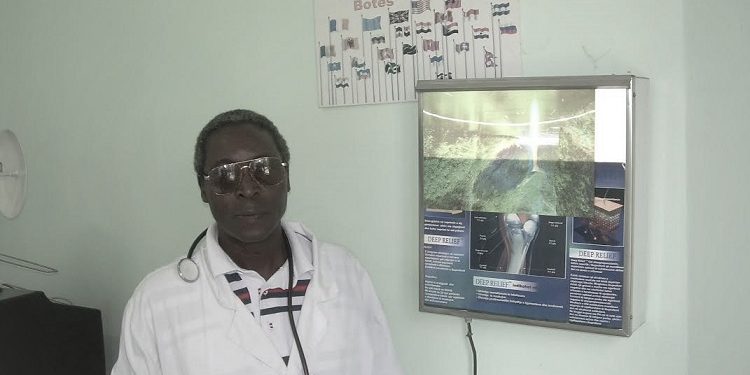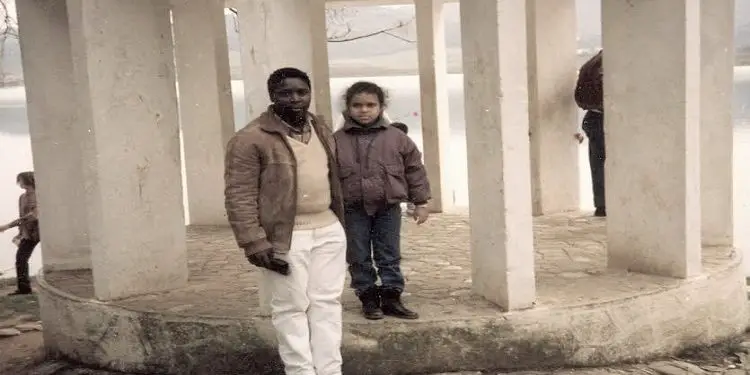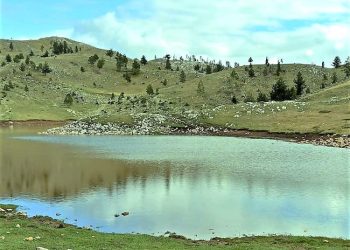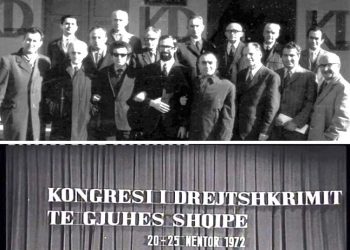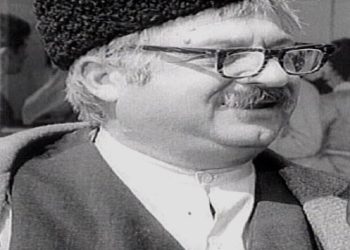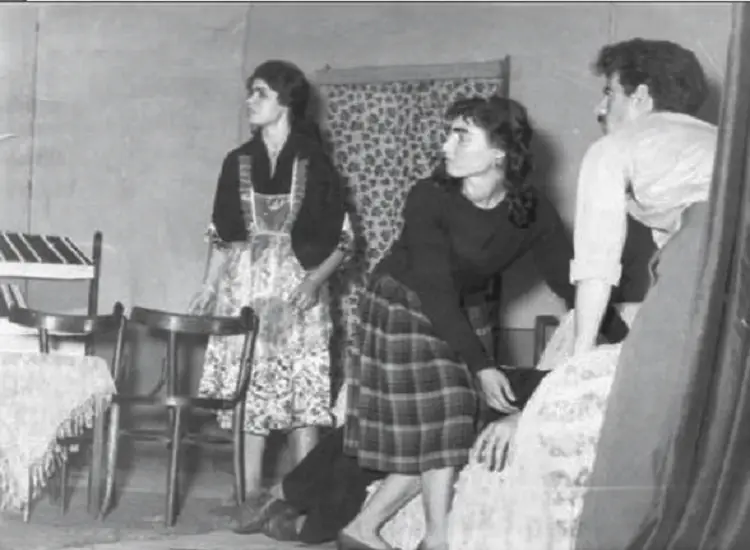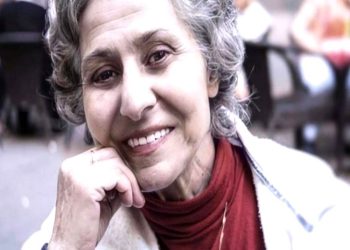From Uvil Zajmi
Memorie.al / In the mid-1960s and 1970s, a bunch of African children, busy and with wide-eyed fear and curiosity, set foot at Rinas Airport. They were children, boys and girls 7, 8, 9 and 10 years old who, secretly from Kinshasa, had abandoned their country and in shorts went down to Rinas, without knowing the language and without any knowledge of the place where they would stay for many years. They did not know and were too young to understand and believe that they would be isolated in that distant and unknown place. They would settle down, get educated, grow up, have fun in places “forbidden” for Albanians, someone would be called an agent, many would run away, but there was also someone who stayed, got married and continues to live and work in Albania.
The only one who has stayed in Albania, who lives in Tirana and works as a rheumatologist in the Vora Ambulance, is Urbain Massena. The son of a high official in the Congolese government, who was forced to leave the country secretly to save his life, becoming an unusual resident of Lezha…!
From Kinshasa to Tirana…!
Everything starts after 1965, with the coup d’état in Zaire and the coming to the throne of the dictator Mubuto, when many opponents together with their families, among them many children, leave with the help of the Red Cross and settle in other countries, mainly in Europe. There were two groups, 10-12-year-old boys and girls who leave Africa for Albania, which was preferred by the Africans, as a European country unlike China or Cuba, which was proposed to them first. In December 1967, they secretly left by ship from the port of Brazzaville, to Tripoli in Libya, then by plane to Rome and from there they landed in Rinas.
It was winter, it was cold, and the young Africans were still in shorts, having left high temperatures in their countries. While the group from Kenya would be settled in Elbasan, the 17-year-old from Zaire, after spending six months in the Children’s Home in Tirana, is transferred to Vlora, in the dormitory of the Medical School. But after a few months, from the latter, the first three leave, as they fail to adapt and the group is reduced to 14 young people.
A year later, another separation: only 9 stay in Vlora, among them, Zhak Jambu with his three sisters, Maria, Nikolet and Klodina, as well as Liljana and Elisabeta Mukeda, while the rest leave for Lezhë.
Africans in Lezha…!
Due to the atmospheric conditions, it was thought that the Africans would settle in the city of Lezha, and Charl Moneng, Charl Davis and Urbain Massena went there first. After two years (1973), Izhen Mulele and Fosten Mynene would join them. Their arrival was a surprise for the residents and in the first days the whole of Lezha was buzzing.
Many citizens stood on the boulevard; curious to see them closely, when they went for a walk. Meanwhile, the new arrivals were advised not to be photographed and not to tell anyone where they are, for fear of killing their family members there in their distant homeland on the African continent. In order to acclimatize and integrate into everyday life, each of them was taken under the patronage of a local peer, so that they could learn about the language.
They settled in the city dormitory, which was located on the hill, below the castle, while they also received a monthly payment of 1000 ALL, (old) as well as clothing and food, all guaranteed by the state.
Music and Blue Pants – Jenas “Cowboy”!
It must be said that the Africans did not know and did not understand that the dictatorial system they left behind in Zaire was even harsher in the small communist country in the Balkans where they chose to stay. However, treated differently and freer than the Albanians, in clothing, tastes, preferences, they had an impact on the youth and life of the citizens of Lezha. Up in the dormitory, together with the Albanian boarders, they spent sleepless nights, with a “Philips” tape recorder and a “Sondra” radio, as the only means of entertainment.
Izheni kept a guitar in his room, bought in Tirana, and sang beautifully the songs of The Beatles, Elvis Preslin, Sanremo or, which he heard on Radio Luxemburg. Africans were often a problem at school as they left the last class on Fridays to listen to the famous Hit Parade of Italian music from the 70s.
Izheni was so passionate about music that once, during the one-month choir, whiles the signal for readiness was given; three students were missing in the call: Izhen Mulele, Agim Lubonja and Kastriot Kodheli. Concerned, the command raised the alarm to find them, but very soon they discovered that they had gone into a secret place, singing the well-known song of the Rolling Stones “I can’t get no”! While the first “Blue Jeans” (“Cowboy”) pants were brought to Lezhë by Yrben Massena in 1972.
From one of his uncles, but also with the interest of his mother, he often received packages of clothes from Germany. This is how a pair of such pants, narrow at the knee and wide below, typical “Coëboy”, with the initials of a famous Italian singer, Don Baki, arrived in Lezhë. Yrben, like no one else, had a big heart, he forgave everything. This is how his friends and colleagues remember him in Lezha.
Birthday, secret!
The birth of Africans has been a great puzzle. Arriving without any documents from their country, they have kept this fact a secret for a long time, in particular, some of them, who were active and played with the “Besëlidhja” youth football team, putting the Albanian Federation of Football. Only years later, when they wanted to get visas to travel outside Albania, were they forced or did they declare the correct date of birth.
Meanwhile, their presence not only in Lezha, but in every city they went to spend their summer vacations, created a different atmosphere. Curiosity started on the train, while they were traveling, to continue in the hotels, where they stayed, around which many curious people gathered.
The right to study, guaranteed by the Albanian state, with free scholarships
Unlike graduates who had completed secondary school and were applying for higher education, the Africans living in Albania benefited from the right to study and a scholarship from the Ministry of Education in the faculties where they preferred.
“Yrbeni, like salt in a dish”, is how he likes to define the time when he stayed and lived in Lezha, where he was treated with a lot of love. He even secured the right to study differently from other Africans. It was received from the Executive Committee, the education department of the city of Lezha. “They took it away from a family from Lezhne, to give me the right to the faculty”, he says with gratitude.
Then he came to Tirana, abandoned sports, and devoted himself to studies at the Faculty of Medicine. He was a very good student and finished his studies with very high results.
Suspicious dance in the tavern of Hotel “Dajti”.
While they were at the faculty in Tirana, all the Africans followed fashion and preferred the tavern of Hotel “Dajti”. They were privileged; no one prevented them from entering, although they were under surveillance. They could have fun among foreigners, every weekend, which was not allowed and was a “forbidden apple” for Albanians!
But the first suspicions began, up to accusations of espionage with foreigners! The one who would suffer first was Zhak Mulele, who was held for three months in the investigator’s cell. They released him, with the condition that he should leave Albania. They called their mother, who came to take them to Tirana, while their sisters let them continue their studies. Likewise, Charl Momeng was forced to leave the faculty that he completed in Austria and today he lives and works as a dentist in Germany.
The third suspect who left was Vitali Pakasa, an African from the Vlora group who returned to Congo. After finishing the university, they all left, while Urbain Massena, Yrbeni or Doctor Beni, was the only one who stayed in Albania.
Yrben and his past
His name is Urbain Massena. He came to Albania when he was only 7 years old, exactly at the end of December 1967, when he should have celebrated his birthday and not taken to the streets. Urbain was the child of a privileged family, and his father was even a member of the governing cabinet, until the arrival of the Mobuto regime. He was born on a holy day, December 25, 1956, Christmas Day. He should have been very lucky, but his life has not been like that!
The son of the Minister of Labor, Zhuasen (once also a football coach), Yrbeni is the second of the six sons of the Massena family (they had no sister). All Catholic, French-speaking, left Zaire in the late 60s.
When he used to buy books for his girlfriend…?!
He was in high school when he fell in love with a classmate, but he didn’t tell her and she didn’t understand anything. While playing football with the youth, he found that every day his playing or training clothes were washed and ironed. She thought it was her, the classmate secretly giving her this surprise, when suddenly she discovers that it was not her, but her close friend.
But Urben’s mind was on what he wanted and not on what helped him. “She was smart and had a desire to read and learn,” he says. And to demonstrate his sympathy, with the money he received, he bought books and gave them as gifts, but he never expressed his love…!
The riots of 1997, the meeting with the mother and her bequest
Until finishing high school, Africans did not have the right to apply and leave Albania. Everything changed during college and after the 80s. When they were in the faculty, they were given the right to go out once every two years and since, during their time as students, they received a monthly payment of 7,000 lek, it gave them the opportunity to live and for something more. “I saved money and bought the ticket with it,” says Urbeni.
He thought of leaving Albania only once, during the 1997 riots. But when he met for the first and last time with his mother, Alfonsina, during his three-month stay in Germany, her message would be unforgettable: “Never deny that people”! He returned to Albania to continue his life and work, but he never saw his mother again.
Many memories…!
Many years have passed since high school, and yet Urbeni keeps many memories from that time. Many happy moments spent at the high school “Hydajet Lezha”, in the city of Lezha, with director Mark Vujin, but also many good people who became like family. One of them was Antoneta Ristani, the math teacher, for four years a foster teacher, who turned into a second mother for her.
Since the arriving Africans spoke French and, by coincidence, French was the second language at school, Yrbeni remembers with nostalgia the teacher of the subject, Antoneta Kola (Kame). Next, his friend and close friend, Kastriot Kodheli, whose home had become a second home for him, as well as the caretaker of the dormitory, Ferid Ramadani, or Petrit Rrapaj in Vlora, Besnik Baren (former member of the Albanian Parliament). He cannot forget former coaches, teammates, Nikolin Lorenci, Vasil Bicin, without forgetting Zhak, who is currently in Germany, his three sisters in France, Austria and Italy, as well as Charl Moneng, with whom he maintains a relationship systematic.
Passion for sculpture, music and boxing!
Fine arts, sculpture are another hobby of Yrben. He could have become a good sculptor, but he had limited time and opportunities to practice that profession. “I am an admirer and I do something, but always at the level of an amateur.
I follow the exhibitions that open and the artist I like is the sculptor Odhise Paskali. His works have art and feeling”, he says about his passions. While in music, it is left to Elton John.
Although the years pass, Elton John remains the idol singer for him. He does not replace it with any, as many memories of the time are connected to his music. Another idol is Kasius Klei, since in his Kinshasa, the 20th century boxing challenge took place, the one between Klei (Muhammad Ali) and George Foreman, in 1974. When he was in Albania, it was seen able to follow it, but that preserves a video tape of that meeting, which was followed by the whole world, not even excluding communist Albania.
Life in Tirana of doctor Massenen
He is the only South African who came in the 60s, who did not leave Albania. He grew up, got married, and got an education and today works as a doctor in Albania, which he considers his second homeland. He says that neither an artist, nor a sportsman, nor a teacher, would have become more than a doctor, which has been and remains his main passion.
A life started with the desire to become a language teacher, then coming to an unknown country, settling in the city of Lezha, then a student at the Faculty of Medicine in Tirana, specializing in the Hospital and for many years in Vorë, at the Polyclinic of the city, where he works as a rheumatologist.
He has never returned to Congo, while passion, correctness for work is important to him. Relations with the daughter Eden have been and remain very important, even vital for Dr. Massena.
Born from cohabitation with an Albanian girl, after the divorce, the girl and her mother moved to Greece. This is where the ordeal of endless problems begins for Massena, who has been going through court proceedings for a long time, in search of the return of the opportunity to hug the girl, since he has not seen her for many years.
Every morning he is among the first citizens of Vora that at 7 o’clock he finds him in a bar drinking coffee, then at the clinic. He lives in Tirana on “Bardhyl” street, he has a simple and modest life, he does not use a car and if you see the photos of the years when he was a student and listen to his story, the expression “C’est la vie” comes to mind, which Dr. Ben always says it. Memorie.al




